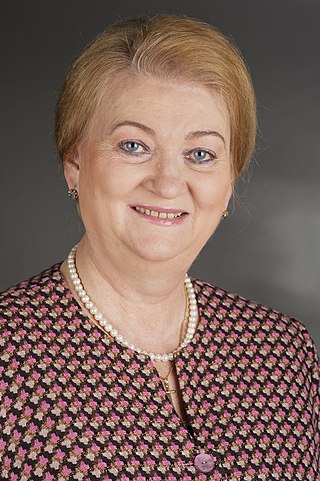Politics of Slovakia takes place in a framework of a parliamentary representative democratic republic, with a multi-party system. Legislative power is vested in the parliament and it can be exercised in some cases also by the government or directly by citizens.

A member of the European Parliament (MEP) is a person who has been elected to serve as a popular representative in the European Parliament.

The Communist Party of Slovakia is a communist party in Slovakia, formed in 1992, through the merger of the Communist Party of Slovakia – 91 and the Communist League of Slovakia.
This is a list giving breakdowns of the European Parliamentary session from 1999 to 2004.

The Christian Democratic Movement is a Christian-democratic political party in Slovakia that is a member of the European People's Party (EPP) and an observer of the Centrist Democrat International.

The National Council of the Slovak Republic, abbreviated to NR SR, is the national parliament of Slovakia. It is unicameral and consists of 150 members, who are elected by universal suffrage under proportional representation with seats distributed via Hagenbach-Bischoff quota every four years.
This is a list giving breakdowns of the members serving in the European Parliamentary session from 2004 to 2009, following the 2004 election. For a full single list, see: List of members of the European Parliament 2004–2009.

Anna Záborská is a Slovak politician of the Christian Union party, living in Bojnice. From 2004 to 2019 she was a Member of the European Parliament, where she was a member of the Group of the European People's Party (EPP). She was a member of the Christian Democratic Movement party (KDH).

Monika Beňová is a Slovak politician who has been a member of the European Parliament since 2004. She is a member of the centre-left Direction-Social Democracy party SMER-SD. SMER-SD is a member of the Party of European Socialists. She presently serves on the Committee on the Environment, Public Health and Food Safety. At the same time she serves as a Quaestor of the European Parliament and therefore she is a member of the European Parliament's Bureau. In present she has opposite views as her mother party - Smer, for example on European Union, NATO, LGBTQ rights in Slovakia, conflict in Ukraine and so on.
There are five types of elections in Slovakia: municipal elections, regional elections, parliamentary elections, presidential elections and elections to the European Parliament. All four types of elections are normally held after fixed periods, although early elections can occur in certain situations. Elections are conventionally scheduled for a Saturday - the polls normally open at 7:00 in the morning and close at 22:00 in the evening. Citizens aged 18 years or older are eligible to vote. Those serving prison sentences for particularly serious crimes, as well as those deprived of legal capacity, including persons with mental disabilities, are denied the right to vote. Voter registration is passive and decentralized with the voter register maintained by municipalities based on the permanent residence register. Voter lists are updated continuously based on municipal records and input provided by state institutions or other municipalities. Voters may verify their data in voter lists, and, if necessary, request correction until the day before election day. On election day, a voter can be added to a voter list upon presenting an identity card with proof of residency. Some 4.4 million voters are registered and valid to vote in the elections. Voters are only able to vote from abroad during the Parliamentary Elections in Slovakia.

Edit Bauer (born 30 August 1946 in is a Slovak politician of Hungarian ethnicity and Member of the European Parliament.

The 2009 European Parliament election was held in the 27 member states of the European Union (EU) between 4 and 7 June 2009. A total of 736 Members of the European Parliament (MEPs) were elected to represent some 500 million Europeans, making these the biggest trans-national elections in history. An additional 18 observers were pre-elected.
The Constitution of Slovakia, officially the Constitution of the Slovak Republic, is the current constitution of Slovakia. It was passed by the Slovak National Council on 1 September 1992 and signed on 3 September 1992 in the Knights Hall of the Bratislava Castle. It went to effect on 1 October 1992.
The Free Forum was a political party in Slovakia, founded in 2004 by dissident parliamentarians from the Slovak Democratic and Christian Union (SDKÚ). Zuzana Martináková is the leader of the party.
Ibrahim Maiga, also known as Ibi Maiga,, is a Slovak singer, actor, comedian, and politician. The BBC describes him as a "celebrity in Slovakia".
Progressive Slovakia is a liberal and social-liberal political party in Slovakia established in 2017. The party is led by Vice President of the European Parliament Michal Šimečka. It is a member of the Renew Europe group and is a full member of the Alliance of Liberals and Democrats for Europe Party. PS has three MEPs: Michal Šimečka, Martin Hojsík, and Michal Wiezik ; Wiezik left the EPP group and Spolu to join PS. Zuzana Čaputová, incumbent President of Slovakia, co-founder and former deputy leader of Progressive Slovakia, was nominated by the party in the 2019 Slovak presidential election, and won by standing for the anti-corruption, environmental and pro-European program. In the National Council, it is represented by deputy Tomáš Valášek elected for For the People, which he left in 2021. In local politics, PS has a dominant position in Bratislava, cooperating with Team Bratislava and Freedom and Solidarity.
Michal Šimečka is a Slovak politician, journalist and researcher who has served as Vice President of the European Parliament since 2022, and as a Member of the European Parliament since 2019. In 2020, Šimečka was elected as Vice President of the liberal fraction Renew Europe. On the Slovak domestic political scene, he is a co-founder of the social-liberal Progressive Slovakia party, leading it from 2022.






